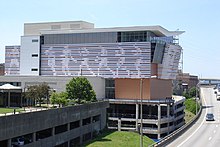Muhammad Ali Center
This article may rely excessively on sources too closely associated with the subject, potentially preventing the article from being verifiable and neutral. (June 2016) |
 The Ali Center, alongside I-64 on Louisville's riverfront | |
 | |
| Established | November 19, 2005 |
|---|---|
| Location | 144 N. Sixth Street Louisville, Kentucky, U.S. |
| Coordinates | 38°15′29.4″N 85°45′36.2″W / 38.258167°N 85.760056°WCoordinates: 38°15′29.4″N 85°45′36.2″W / 38.258167°N 85.760056°W |
| Type | Biographical, boxing |
| Website | www |
The Muhammad Ali Center is a non-profit museum and cultural center dedicated to boxer Muhammad Ali in Louisville, Kentucky. Ali, a native of Louisville, and his wife Lonnie Ali founded the museum in 2005.[1]
The six-story, 96,750 sq ft (8,988 m2) museum is located in the city's West Main District. It opened on November 19, 2005 at a cost of $80 million.[2] It also includes a 40,000 sq ft (3,700 m2) two-level amphitheater and a plaza.
On April 4, 2013, a new pedestrian bridge opened, helping residents and visitors connect from the Muhammad Ali Center's plaza to the Belvedere, the Waterfront, and other downtown attractions. The 170-foot-long walkway is nine feet wide, with exterior metal panels that complement the Ali Center plaza's design.[3]
History[]
In 2020, the Muhammad Ali Center in Louisville and the SEEK Museum in Russellville were added to the U.S. Civil Rights Trail.[4]
Description[]
The cultural center features exhibitions regarding Ali's six core principles of confidence, conviction, dedication, giving, respect, and spirituality.[5] Throughout his life, Muhammad Ali strived to be guided by these core principles in his quest to inspire people around the world, dedicating himself to helping others, being the best athlete he could be and by standing up for what he believed in.[2]
An orientation theater helps present Ali's life. A mock boxing ring is recreated based on his Deer Lake Training Camp. A two-level pavilion, housed within a large elliptical room, features Ali's boxing memorabilia and history. A large projector displays the film The Greatest onto a full-sized boxing ring. There are also booths where visitors can view clips of Ali's greatest fights on video-on-demand terminals, which also feature pre- and post-fight interviews.
Another exhibit offers visitors the chance to explore sense of self, others and purpose through an interactive terminal program. Visitors are encouraged to share what they are fighting for in the Generation Ali Story Booths [6]
Two art galleries, the LeRoy Neiman Gallery and the Howard L. Bingham Gallery, feature rotating exhibits that are located on the third floor.
Gallery[]

Ali's Presidential Medal of Freedom on display

See also[]
- List of attractions and events in the Louisville metropolitan area
- List of museums focused on African Americans
- List of museums in the Louisville metropolitan area
References[]
- ^ Crouse, Karen (June 9, 2016). "Muhammad Ali Was Her First, and Greatest, Love". The New York Times (in American English). ISSN 0362-4331. Retrieved June 3, 2021.
- ^ a b "Fact sheet." Muhammad Ali Center, Muhammad Ali Center, Louisville
- ^ "Mayor Opens Ali Pedestrian BridgeI". April 4, 2013. Archived from the original on April 24, 2013.
- ^ "Sites in Tennessee, Kentucky added to Civil Rights Trail". February 14, 2020.
- ^ "About the Ali Center".
- ^ "Muhammad Ali Center Exhibits".
External links[]
| Wikimedia Commons has media related to Muhammad Ali Center. |
- 2005 establishments in Kentucky
- African-American museums in Kentucky
- Biographical museums in Kentucky
- Boxing museums and halls of fame
- Muhammad Ali
- Museums established in 2005
- Museums in Louisville, Kentucky
- Personal development
- Sports museums in Kentucky



